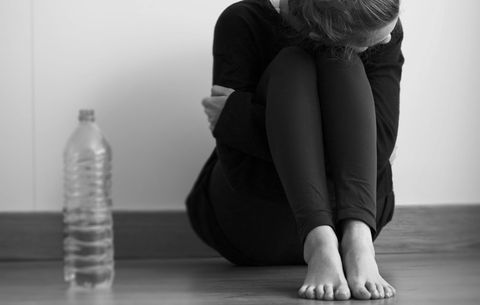The internet provides a space to express what we’re too afraid to speak out loud. This is especially important for people suffering from an eating disorder, which manifests itself in hidden lifestyles and habits we work tirelessly to hide from our friends and family. This space, however, has been negatively utilised to fuel the disorder – we must work to eliminate this defeatist attitude.
Eating disorders are not a joke, a ‘phase’, or something that can disappear overnight. Whether it’s bulimia, anorexia, a binge eating disorder, body dysmorphia, orthorexia (stemming from an obsession with healthy eating and exercise), a combination of the former, or any other food-related illness – you are mentally and physically sick. Feeling isolated, guilty, anxious, depressed or having extremely low self-esteem is not uncommon. These emotions, combined with weight loss, weight gain, rotting teeth, bad skin, brittle nails, damaged hair, lack of sex drive, exhaustion, binging (eating excessive amounts of food, usually in secret), restrictive dieting, purging (self-induced vomiting, laxative abuse, or obsessive exercise) and for females, absence of a period, make an eating disorder something that permeates every aspect of your life. Since these behaviours become so embedded in your attitude towards yourself and the way you execute your days, recovery seems impossible.
There are some aspects of it which one does not have control over. Namely, how you behave towards others or the kinds of messages you send out to people. It is this point which leads to my next: various sites which provide tips on “how to have an eating disorder”, as well as actively encouraging people to starve, binge, or purge their food, are never excusable. ‘Thinspo’ (sites posting ‘inspiring’ images of a certain body, and ways to achieve this), or ‘Pro Ana’ (where ‘Ana’ stands for anorexia nervosa, ‘Pro’ for obsessive dedication to it) blogs and forums are some of the most toxic things to plague the internet. Even WhatsApp groups, in which exclusive entry is offered to those who meet a certain criteria of height, weight and age, exist to perpetuate this poisonous mind-set. This comprises a tiny part of the internet: overtly, social media platforms, online magazines and Youtube videos prompt various ways to achieve the ‘ideal’ body, which only fuel negativity.
I am no stranger, as I’m sure others suffering would admit, to going on these sites in search of some solution. It’s strangely comforting to know that you are not alone. When you’re in this mentality, anything to silence the voice in your head, satisfy the hunger or fuel the disorder is welcomed. This is not our fault. It comes as no surprise that a distinct correlation between the increase of social media consumption and the rise of eating disorders prevails.
Constant exposure to images of the ‘perfect body’, fad diets and Photoshop have infringed the ability to love ourselves. Instagram, Tumblr, Twitter, Facebook, online platforms and magazines provide ample advice on ways to ‘slim down’ and ‘get fit’. Moreover, the upsurge of cyber-bullying means laptop and mobile screens have become mechanisms for spreading hatred, which body-shaming comprises a large part of. Note that these socio-cultural factors are not the only causes of eating disorders: biological, psychological and familial influences are equally viable.
The internet, therefore, has created a dark place to hide the disorder. This notion, combined with the independence of being a university student, means many sufferers have taken refuge behind the screen. Pressure to complete deadlines, budget efficiently, stay healthy, be social, whilst having to endure the nagging voice of an eating disorder is exhausting. Consequently, feelings of isolation and anxiety occur that hinder the capacity to speak out loud. In turn, these websites, blogs, social media platforms and online magazines seemingly present an answer.
Every day, numerous advertisements, starring models who conform to an idealised perception of ‘beauty’ (largely achieved through Photoshop), impose the view that only a certain image is deemed truly beautiful. The internet provides a solution to this: “follow this diet, do these exercises, and you can look like them too!” And, it seems, if you cannot achieve a certain look, or certain body-type, you are not worthy, or will be judged differently from others.
The dual-nature of eating disorders, since they involve both mind and body, indicates that exposure to this material enforces a defeatist attitude, self-destructive behaviour and, in some cases, death. This ever-growing sphere of online toxicity has essentially created an instruction manual which can only be labelled ‘A Guide To Having An Eating Disorder’. It’s easy to be drawn in by magazines and fitness stars who propose rigid meal plans and strict exercise regimes, and to popular Instagram accounts that promote ‘clean eating’. Too much exposure to this content, for some, can lead to unhealthy
The term ‘healthy lifestyle’ requires balance, deriving from a mentality which views eating properly and exercising as enjoyable, something to benefit yourself. It should not become a chore, or as a means to conform to unrealistic beauty standards set up by the media and the internet.
It’s so easy to deny the reality of an eating disorder and hide behind the screen. Recovery is still far away, and I cannot pretend that it’s easy. What I do acknowledge, however, is that certain social media outlets, as explained above, either hinder efforts to recognise the existence of an eating disorder, or feed a mind-set which conceives having an eating disorder as an achievement of sorts. The harsh reality remains that, in the UK alone, approximately 1.25 million people have an eating disorder (BEAT). This does not account for the vast number who are yet to seek help or suffer alone. It is evident, therefore, that the dangerous, even fatal existence of these blogs websites and forums need to be eradicated.
If you, a family member, friend, or anyone else exhibits signs of, or suffers from an eating disorder, visit these useful links:
problems/types-of-eating-disorders/#.WpMpWyOcY0Q
Jess Moody

